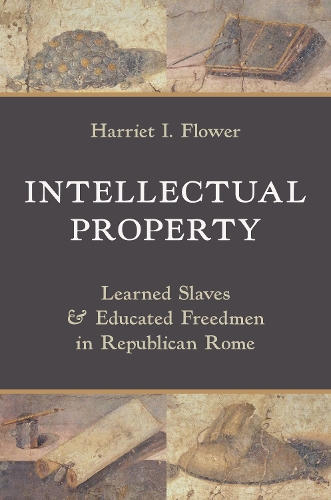
Intellectual Property: Learned Slaves and Educated Freedmen in Republican Rome
(Hardback)
Publishing Details
Intellectual Property: Learned Slaves and Educated Freedmen in Republican Rome
By (Author) Harriet I. Flower
By (author) Harriet I. Flower
Princeton University Press
Princeton University Press
14th January 2026
United States
Classifications
Tertiary Education
Non Fiction
History of ideas
Physical Properties
Hardback
264
Width 156mm, Height 235mm
Description
The first in-depth account of the lives and careers of educated slaves and freedmen in ancient Rome
Slaves and freedmen played an important yet understudied role in the literary culture of the Roman Republic. Though their work went largely uncredited, they fulfilled vital roles as editors, researchers, and collaborators in the service of Rome's literary and political elite. Intellectual Property tells the stories of these gifted and highly educated young men, from Licinius the flute-player, who shaped the rhetorical style of the orator Gaius Gracchus, to the grammarian and teacher Tyrannio of Amisus, who was brought to Rome as a war captive.
Highlighting the unique social prestige of literary production and intellectual performance in a society pervaded by slave labor, Harriet Flower shows how the exorbitant prices paid for the highly educated encouraged a complex system of training young boys for the marketplace or acquiring educated captives as booty, and how they were treated as valuable assets to be deployed as prizes, gifts, or investments that could bestow financial and cultural capital. She demonstrates how enslaved and manumitted intellectuals, far from being menial workers, shared close relationships with leading Romans of the day. They came from a variety of backgrounds and were relied on as coauthors and collaborators in a range of genres, with some gaining fame as authors themselves.
With lively case studies and insightful new interpretations of the ancient sources, Intellectual Property paints a more nuanced picture of enslaved labor in ancient Rome, revealing how the contributions of enslaved intellectuals were closely linked to the ambitious development of Latin literary culture and the dissemination of knowledge.
Author Bio
Harriet I. Flower is the Andrew Fleming West Professor of Classics at Princeton University. Her many books include The Dancing Lares and the Serpent in the Garden: Religion at the Roman Street Corner and Roman Republics (both Princeton).
